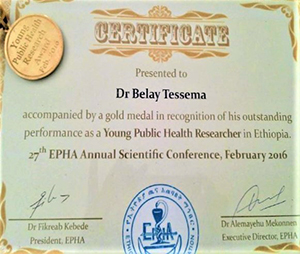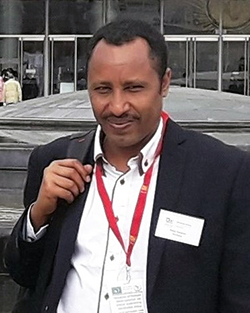To see “healthy, productive and prosperous Ethiopians” is former TDR fellow Belay Tessema’s goal – and he is working in this direction through efforts to improve diagnostics, particularly for tuberculosis (TB) and HIV, two of the largest killers in his country. His research has been published in high impact factor journals such as the Lancet, the European Respiratory Journal and the Journal of Clinical Microbiology. Earlier this year Belay was awarded a prestigious Georg Forster Research Award from the Alexander von Humboldt Foundation in recognition of his accomplishments in research and teaching.
Ethiopia is an East African country with a population of around 110 million – among the highest in the world. The country has tremendous health problems, with infectious diseases such as TB, HIV/AIDS and malaria taking a toll on its people and economy. Yet, as with many other low-income countries, health care facilities, research facilities and qualified professionals are limited. It is against this backdrop that Ethiopian scientist Belay Tessema is conducting his research and training new generations of scientists. Ambition from a young ageBelay was always a studious and ambitious child. The youngest of eight children born to farmers, he was determined to do well in life. From a relatively young age he had decided he would become a successful scientist. |
Belay pictured at an EDCTP |
When he was a student in grade 12 at school (the year he took his school leaving examination) Belay’s mother died. That, he says, “was the most challenging and difficult time” for him. Nevertheless, he managed to stay focused on his studies and career goals.
Seeing medical sciences as a way to make his contribution to “serving the community”, Belay completed his diploma from Gondar College of Medical Sciences (now, the University of Gondar) in 1998. This was followed by a BSc from Jimma University. In 2003, he became an assistant lecturer at the University of Gondar, and after completing his MSc at Addis Ababa University, he became a lecturer in tropical and infectious diseases.
The start of a research career
In 2008 Belay won a German Academic Exchange Service (DAAD) scholarship and went on to study for (and complete in 2012) a PhD at the University of Leipzig, Germany. His research resulted in the identification of four new phylogenetic lineages of Mycobacterium tuberculosis circulating in Ethiopia. This may help in the development of new molecular diagnostic tests that can detect M. tuberculosis strains circulating in the country.
Belay returned to Ethiopia after his PhD and continued his research work while also teaching master's and PhD students in medical microbiology. “My passion”, says Belay, “is conducting problem-solving research and helping people who are in a difficult situation”.
His first research project as a principal investigator (PI) was a United Nations Children's Fund (UNICEF) study on the efficacy of BCG vaccination. Since then, his areas of study have included drug-resistance among HIV-positive and HIV-negative TB patients, improving tuberculosis case detection, studying the epidemiology, diagnosis and treatment of tuberculosis in the Amhara region of Ethiopia, and work on improving the diagnosis of M. tuberculosis and M. bovis.
A changed career direction following a TDR Clinical Research and Development Fellowship
Belay first came across TDR through the internet – when he saw a call for applications for TDR’s Clinical Research and Development Fellowships (CRDFs) “I was eager to advance my knowledge and skills on clinical research and development,” he says. His application was successful and he was awarded a fellowship, which he carried out as part of the TB programme based at the Foundation for Innovation New Diagnostics (FIND) in Geneva, Switzerland.
With a supportive home institution and a good relationship with his supervisor, Dr Claudia Denkinger, the CRDF was a very positive experience for Belay. During this time, he says he “benefited and learnt a lot.” Some of the experiences that had the biggest impact on his career included getting new experience in clinical trial protocol development, target product profile development, trial site assessment, trial initiation and coordinating and monitoring. He also learnt about Biobank establishment and management, and strengthened his skills in good clinical practice, systematic review and meta-analysis and guideline development. His greatest pleasure during the fellowship was the “team work”, and he remains in touch with Dr Denkinger and other staff members of FIND as well as with other Fellows that he met. Research on a FIND Tuberculosis Strain Bank has since been published in the Journal of Clinical Microbiology. The Strain Bank provides highly characterized and high-quality strains as a resource for researchers and developers in support of the development and evaluation of new diagnostics and drug resistance detection tools.
Belay credits the experience, particularly his new exposure to clinical research and development, as changing his research focus; he shifted from epidemiological research into clinical research and development of new solutions (tools) for infectious diseases. He remains a TDR alumnus.
An award-winning scientist
It is not surprising that Belay has won another award for his work – his award winning kicked off back in 1998 when he won a “best students award” from his college. This achievement was followed by several other “best” awards and a “Young Public Health Researcher Award” from the Ethiopian Public Health Association (EPHA) in 2016 (pictured).
 Belay’s award from the Ethiopian Public Health Association | The Georg Forster Research Award (which is granted each year to six internationally renowned academics from developing and transition countries) was given earlier this year in recognition of Belay’s entire academic record to date. “I was truly honoured to receive this award, not just for myself but for the scientists of Ethiopia,” says Belay, who credits TDR’s Fellowship award for helping him win the award. |
During his career Belay has also won more than 18 research and capacity building grants from national and international funding organizations as PI and co-investigator, and has published nearly 100 research articles in high-impact factor journals.
Leadership in research and teaching
During his career, Belay has had a number of leadership roles, for example as coordinator of the One Health Consortium of the University of Gondar, founder and executive board member of the Ethiopian Society for Microbiology and executive board member of the Ethiopian Medical Laboratory Association. Since January 2015 he has also been coordinator of the International Federation of Clinical Chemistry and Laboratory Medicine (IFCC) Task Force of Young Scientists. He is also editor-in-chief of the Ethiopian Journal of Laboratory Medicine.
Currently, Belay works as an associate professor in medical microbiology and epidemiology of infectious diseases at the University of Gondar, although he has been on sabbatical leave back at the University of Leipzig in Germany since October 2019. He continues to teach – “I enjoy it very much,” he says.
A vision for the future
When asked about Ethiopia’s key health challenge at the moment, Belay has no hesitation is stating “infectious diseases”, with the greatest needs in terms of diagnostics being for “rapid, accurate, low cost, and easy to use tests”. He says he chose the research career pathway because he believes that “research is one of the main tools to solve the existing health problems in Ethiopia.” Yet his work is not without its frustrations. One of these is the need for improved research facilities to conduct advanced research in the country.
As for scientists all around the world, Belay’s work has also been affected by COVID-19. He feels that it is important that Ethiopia continues to strengthen its health care facilities, teach its people about the basic COVID-19 transmission, prevention and control measures recommended by WHO, and enforce practice within the community.
Belay’s personal ambition remains to "promote the health and well-being of Ethiopians” which he hopes to achieve by providing and regulating a comprehensive package of promotive, preventive, curative and rehabilitative health services of the highest possible quality in an equitable manner.
Married, and with two sons, Belay credits his family for helping him get to where he is now. But he is not falsely modest, and acknowledges the role that his own hard work has had in transforming him from the son of a farmer into an internationally respected expert in TB and HIV diagnostics.


